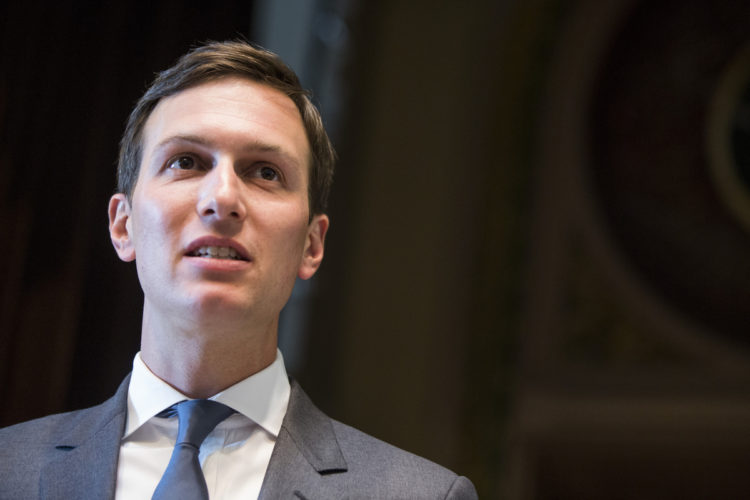Kushner Paves Way for Accelerated U.S. Push on Mideast Peace

(Bloomberg) —Jared Kushner’s return to Israel this week bolsters White House efforts to broker a peace deal, as Prime Minister Benjamin Netanyahu examines what he needs to give Palestinians to bring ties with the broader Arab world out of the shadows, diplomats and Israeli government officials said.
Kushner, President Donald Trump’s son-in-law and designated chief for Mideast diplomacy, is due to arrive Wednesday to meet Netanyahu, Palestinian Authority President Mahmoud Abbas and other central players. In his own trip to the region last month, Trump said nurturing relations between Israel and Saudi Arabia could help produce the wider Mideast pact that former U.S. President Barack Obama and his predecessors failed to deliver.
Kushner’s presence, weeks after Trump made the Israeli-Palestinian peace track a centerpiece of his first foreign trip as president, “raises the stakes for everybody,” according to Dan Shapiro, the Obama-era ambassador to Israel.
While both Netanyahu and Abbas say they’re eager to revive talks under the new administration, any conciliatory tone evident during Trump’s visit has evaporated. Netanyahu said in a Facebook post Tuesday he was proud to break ground on Israel’s first new West Bank settlement in decades, fulfilling a pledge to resettle residents evacuated from an illegal settlement outpost earlier this year. An Abbas spokesman responded that the project would “undermine” Kushner’s mission.
Cabinet allies say Netanyahu’s primary focus now is on building relations with Arab states in the Persian Gulf, which already are cooperating quietly with Israel, primarily on security matters involving shared foes.
“There’s a very good chance that we will soon have relations with what we call the Saudi coalition,” said Communications Minister Ayoob Kara, the Israeli cabinet’s only Arab member. “The Palestinian issue is No. 3 on the agenda today,” he said, behind security concerns about Iran and terrorism that Israel and Saudi Arabia have in common.
Finance Minister Moshe Kahlon said at a political conference Tuesday that Israel is feeling “mounting American pressure to advance a deal” with the Palestinians.
Kushner, the 36-year-old husband of Trump’s daughter Ivanka, has come under pressure himself from reports that he discussed creating a secret line of communication with the Russian government while Obama was still president. The New York Times reported Sunday that he may hire criminal defense lawyers to represent him in the widening federal probe into Russia’s meddling in the 2016 election.
Condolence Call
Kushner and Trump diplomatic envoy Jason Greenblatt, who accompanied the U.S. president to Saudi Arabia, Israel and the West Bank last month, are returning to ask Netanyahu and Abbas “about their priorities and potential next steps,” the White House said in a statement Sunday. Greenblatt and Netanyahu met Tuesday afternoon.
Saudi Arabia and its Gulf neighbors have indicated a willingness to upgrade unofficial ties with Israel, but veteran diplomats say that will depend on Israel’s willingness to withdraw from West Bank territory and commit to a Palestinian statehood, as spelled out in the 2002 Arab Peace Initiative.
Kushner and Greenblatt are wary of proceeding too quickly and want to make sure that both Israelis and Palestinians are willing to make substantial compromises, said Nimrod Novik, a longtime envoy for former Israeli President Shimon Peres who still undertakes diplomatic tasks.
“Neither side trusts the other, so you have an orchestra conductor in Washington to make sure that nobody feels like a sucker when they do something constructive and see that it’s not reciprocated,” said Novik, an adviser to the U.S.-based Israel Policy Forum.
Maximum Leverage
Others say Trump needs to act quickly to sew up the deal before investigations entangling him eat away at his presidential power. After hosting Abbas and Netanyahu separately at the White House and visiting them in the Middle East, Trump has “maximal leverage right now,” Shapiro said in a conference call with reporters on Monday.
“It’s very difficult for any party in the region to say no” to Trump, said Shapiro, now a visiting fellow at the Institute for National Security Studies in Tel Aviv. “If the investigations drag on for a long period of time and there begin to be questions raised about the future of his administration, that will contribute to a lessening of his leverage.”
Abbas, who previously said he would not enter peace negotiations unless Netanyahu froze all settlement construction, recently indicated he would drop the condition. Still, Netanyahu’s announcement of a new settlement on the eve of Kushner’s arrival drew a sharp Palestinian rebuke.
“This is a serious escalation,” Abbas spokesman Nabil Abu Rudeineh said in an email. It’s an “attempt to undermine the efforts of the American administration.”
Covert Ties
Through U.S. mediators, Israel and Saudi Arabia have discussed a variety of potential actions that would show their intention to develop open diplomatic relations once the conflict with the Palestinians is resolved, Kara said.
The two countries have a long history of covert defense cooperation, and Saudi Arabia has expressed interest in Israeli technology connected to cybersecurity, desalination and agriculture. Gestures being discussed include allowing Israeli businesses to operate in Saudi Arabia and authorizing Israeli planes to fly over the kingdom, which would shave up to three hours off flights to Asia, Kara said.
Saudi Arabia won’t take such actions, though, unless Israel offers significant steps that allow its leaders to say they won significant concessions for the Palestinians, such as releasing prisoners, expanding construction rights in the West Bank or easing conditions in Gaza, said Joshua Teitelbaum, a senior research associate at Bar Ilan University’s Begin-Sadat Center for Strategic Studies.
“There’s no benefit to the Saudis to allow overflights or low-level economic stuff when they can basically get what they want from Israel without that,” he said. “Why buy the cow when you can get the milk for free?”
To contact the reporter on this story: Jonathan Ferziger in Tel Aviv at jferziger@bloomberg.net To contact the editors responsible for this story: Alaa Shahine at asalha@bloomberg.net Michael S. Arnold, Amy Teibel





No Comment